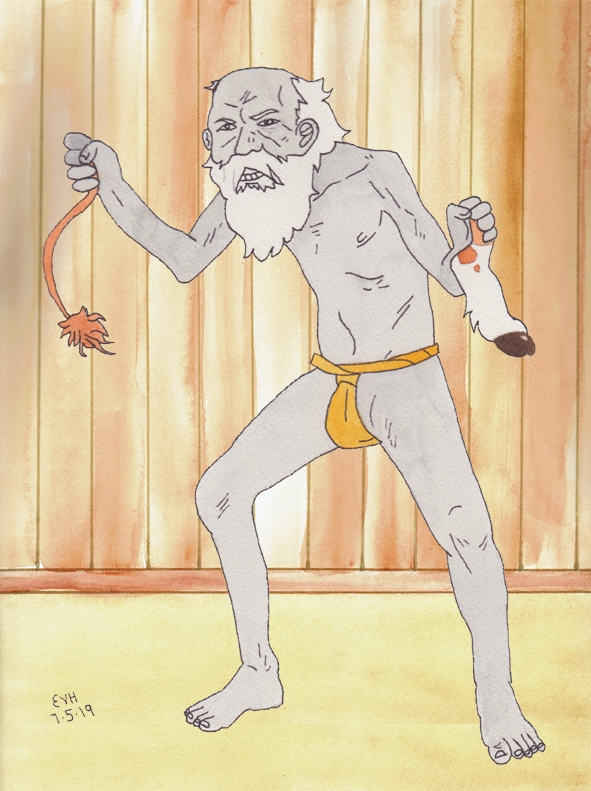
Jataka 144
Naṇguṭṭha Jātaka
The Tail
as told by Eric Van Horn
originally translated by Robert Chalmers, B.A., of Oriel College, Oxford University
originally edited by Professor Edward Byles Cowell, Cambridge University
This story concerns the Ājīvikas who were a competing group of samaṇa with the Buddhists and Jains. The Ājīvikas believed that everything is preordained and that there is no free will. They also did ascetic practices that were supposed to prevent the creation of any new karma. They lasted about 2,000 years.
“Vile Jātaveda.” (Jātaveda is the Vedic god of fire, also called “Agni.”) This story was told by the Master while he was at Jetavana. It is about the false austerity of the Ājīvikas, or naked ascetics. Tradition tells us that behind Jetavana they used to practice false austerities (extreme ascetic practices to which the Buddha was opposed). A number of the monks saw them painfully squatting on their heels, swinging in the air like bats, reclining on thorns, scorching themselves with five fires, and so forth in their various false austerities.
They were moved to ask the Blessed One whether any good resulted from this. “None whatsoever,” the Master answered. “In days gone by, the wise and good went into the forest with their birth-fire (the fire lit at their birth), thinking that they could benefit from such austerities. But they did not find themselves any better off for all their sacrifices to the fire and similar practices. So they doused the birth-fire with water until it went out. Then by the practice of meditation they attained the Knowledges (the power of faith, the power of moral shame, the power of moral dread, the power of energy, and the power of wisdom) and Attainments (the eight jhānas), and they earned rebirth in the Brahma Realm.” So saying he told this story of the past.
Once upon a time when Brahmadatta was reigning in Benares, the Bodhisatta was born as a brahmin in the North country. On the day of his birth his parents lit a birth-fire.
In his sixteenth year they said to him, “Son, on the day of your birth we lit a birth-fire for you. Now you must choose. If you wish to lead a family life, learn the Three Vedas. But if you want to earn rebirth in the Brahma Realm, take your fire with you into the forest and tend it. This will win Mahā-Brahmā's favor and you will enter into the Brahma Realm.” He told his parents that a family life had no appeal to him. So he went into the forest and lived in a hermitage tending his fire.
One day an ox was given to him as alms in a border village. When he drove it home to his hermitage, he decided to sacrifice the cow to the Lord of Fire. But he did not have any salt. He thought that the Lord of Fire could not eat his meat offering without it. He decided to go back the village to get some salt. He tied up the ox and set off.
While he was gone, a band of hunters came up and saw the ox. They killed it and cooked it for dinner. What they did not eat they took with them, leaving only the tail and the hide and the legs. When the brahmin returned, he found only these sorry remains. The brahmin exclaimed, “As this Lord of Fire cannot so much as look after his own, how shall he look after me? It is a waste of time to serve him. It brings neither good nor profit.”

Figure: “This is a complete waste of time.”
Having lost all his desire to worship Fire, he said, “My Lord of Fire, if you cannot manage to protect yourself, how shall you protect me? The meat being gone, you must now feast on this waste.” He threw the tail and the rest of the robbers’ leavings on the fire and uttered this stanza:
Vile Jātaveda, here’s the tail for you.
And think yourself lucky to get so much!
The prime meat’s gone. Put up with tail today.
So saying the Great Being put the fire out with water and went off to become a recluse. And he won the Knowledges and Attainments and ensured his rebirth in the Brahma Realm.
His lesson ended, the Master identified the birth by saying, “I was the ascetic of those days who quenched the fire.”
